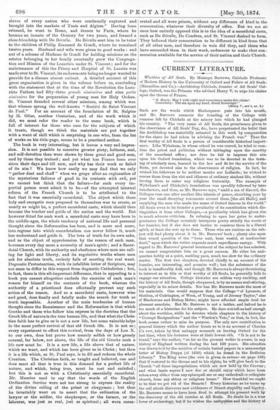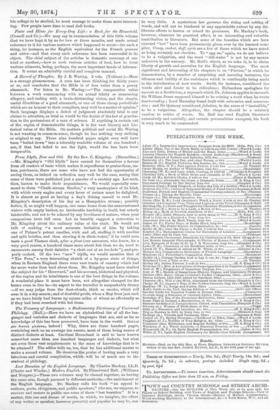CURRENT LITERATURE.
Worthies of All Souls. By Montagu Burrows, Chichele Professor of Modern History in the University of Oxford and Fellow of All Souls. (Macmillan and Co.)—Archbishop Chichele, founder of All Souls' Col- lege, Oxford, was the Primate who advised Henry V. to urge his claims upon the throne of France.
"Ti. Henry: May I with right and conscience make this claim? Canterbury: The sin upon my head, dread Sovereign!"
(Henry V., act 1, so. 2.) Such are the words which Shakespeare puts into his mouth, and Mr. Burrows connects the founding of the College with remorse felt by Chichele at the misery into which he had plunged his country. " The very name of All Souls, the prominence given to the observance of All Souls' Day, &c., have perpetuated the belief that the Archbishop was materially actuated in this work by compunction for the share he had taken in advising the French war." Thus the first worthy of All Souls is a person of considerable historical import- ance. Like Wykeham, in whose school he was reared, he tried to com- bine the priest and politician without infringing upon the sanctity of the sacerdotal office ; nor does he fail to impress this aim upon his Oxford foundation, which was to be devoted to the train- ing of scholarly men, learned in the law and fit for the service of the State, yet devoted also to the observances of religion. In fact, he wished his followers to bo neither monks nor Lollar& ; he wished to rescue them from the riot and idleness of ordinary student life, without forcing them to enter any religious fraternity. The example of Wykeham's and Chichele's foundations was speedily followed by later benefactors, and thus, as Mr. Burrows says, " amid a sea of discord, the Colleges rose one after another like islands of peace, absorbing year by year the small decaying tenements around them [the old Halls], and supplying the men who made the name of Oxford famous in the world." All Souls owes to its founder a peculiarity of its constitution which dis- tinguishes it from other Colleges,—a peculiarity which has given rise to much adverse criticism. In refusing to open her gates to under- graduates the College certainly interprets pretty strictly the words of her founder, but if she does not hasten to construe them in a liberal spirit, at least she acts up to them. Those who are curious on the sub- ject will find plenty about it in Mr. Burrows' book ; plenty also upon that vexed_ question of the "bone nati, bene vestiti, et mediocriter doeti," upon which the writer expends much superfluous energy. With regard to Mr. Burrows' general treatment of the subject he has selected, we cannot congratulate him on a great success. He rides his anti- quarian hobby at a quiet, ambling pace, much too slow for the ordinary reader. The first two chapters, devoted chiefly to an account of the founder, are interesting, and promise well ; but the substance of the book is insufferably dull, and though Mr. Burrows is always threatening to interest us in this or that worthy of All Souls, he generally fails to engage our attention. College histories are seldom very exciting, and the history of All Souls, though chequered, is by no means soul-stirring,. especially in its minor details. Nor has Mr. Burrows made the most of his materials. One would suppose that the College Qe of Lynacre, of Sheldon, of Codrington, of Wren, of Young, and of Jeremy Taylor," also of Blackstone and Bishop Heber, might have afforded ample food for pleasant anecdote. But Mr. Burrows is not a tattler, and indeed he in too much of a historian for his subject. He does not tell us half enough about the worthies, while he devotes whole chapters to the history of " Corrupt Resignations " and the " Warden's Veto," so that, in fact, the book seems rather to miss its purpose. The only new contribution to general history which the author treats us to is an account of Charles L's vow, taken by that unhappy monarch on leaving Oxford for the last time, when his fortunes were at their lowest ebb. "It is not to be found," says the author, as far as the present writer is aware, in any history of England written during the last 150 years. His attention was drawn to it by the mention of certain buried papers in a manuscript letter of Bishop Duppa (of 1650) which he found in the Bodleian Library." The King vows (the vow is given in extenso on page 180) that if restored to the throne and to his rights, he will give back to the Church "all those impropriations which are now held by the Crowne ; and what lands soever I now doe or should enjoy which have been taken away either from any episcopall see or any cathedral' or collegiate church, from any abbey or religions house." How thankful we ought to be that we got rid of the Stuarts ! Every historian as he turns up the soil afresh discovers new evidences of Stuart stupidity and bigotry. Mr. Burrows seems to have been fired to attempt his present work by the discovery of the old reredos at All Souls. No doubt he is a true lover of arehasology, but if he wishes the antiquities and the history of
laie college to be studied, he must manage to make •them more interest- ing. Few people have time to read dull books.



































 Previous page
Previous page